Author: Shantideva Bodhisattva (* Shantideva Bodhisattva is known as a direct disciple of Manjusri Bodhisattva)
The Key of becoming a Bodhisattva:
One who wishes to protect oneself and others quickly, should practice exchanging oneself for others, which is a great mystery.
All those who are unhappy in the world are so as a result of their desire for their own happiness.
All those who are happy in the world are so as a result of their desire for the happiness of others.
Enough of such talk!
Note the difference between the fool who seeks his own benefit, and the sage who works for the benefit of others.
One, who does not exchange his own happiness for the suffering of others, surely does not achieve Buddhahood. How could one find happiness even in the cycle of existence?
Therefore, in order to alleviate my own suffering and to alleviate the suffering of others, I give myself up to others, and I accept others as my own self.
--------------------------------------------------------------------------------
Chapter 1
Chapter 2
Chapter 3
Chapter 4
Chapter 5
Chapter 6
Chapter 7
Chapter 8
Chapter 9
[In copying this ancient manuscript we discovered various translations from different traditions. The reader can be comforted to know that they all agreed with one another in substance, however, some were easier to understand in places then others. In making this text available we worked hard to ensure that it would be comprehensible. In every case we selected the verse that we felt was easiest to understand. BIONA ED.]
-------------------------------------------------------------------------------------------------------------------
Chapter Six
The Perfection of Patience
1. Anger destroys all the good conduct, such as generosity and worshipping the Sugatas, which has been acquired over thousands of eons.
2. There is no vice like hatred, and there is no austerity like patience. Therefore, one should earnestly cultivate patience in various ways.
3. The mind does not find peace, nor does it enjoy pleasure and joy, nor does it find sleep or fortitude when the thorn of hatred dwells in the heart.
4. Even dependents whom one rewards with wealth and honors wish to harm the master who is repugnant due to his anger.
5. Even friends fear him. He saddens his friends. He attracts with generosity but is not served. In brief, there is nothing that can make an angry person happy.
6. One who recognized hatred as the enemy, knowing that it creates sufferings such as these, and persistently overcomes it, becomes happy in this world and in the other.
7. Finding its fuel in discontent originating from an undesired event and from an impediment to desired events, anger becomes inflamed and destroys me.
8. Therefore, I shall remove the fuel of that enemy, for that foe has no function other than to harm me.
9. Even if I fall into extreme adversity, I should not disrupt my happiness. When there is frustration, nothing is agreeable, and virtue is forsaken.
10. If there is a remedy, then what is the use of frustration? If there is no remedy, then what is the use of frustration?
11. For loved ones and for oneself, one does not desire suffering, contempt, verbal abuse, or disgrace; but for an enemy, it is the opposite.
12. Happiness is obtained with great difficulty, whereas suffering occurs easily. Only through suffering is there release from the cycle of existence. Therefore, O mind, be strong!
13. The devotees of Durga and the people of Karnata needlessly endure the pain of burns, cuts, and the like. Why then am I timid when my aim is liberation?
14. There is nothing whatsoever that remains difficult as one gets used to it. Thus, through habituation with slight pain, even great pain becomes bearable.
15. Do you not consider the pain of bugs, gadflies, and mosquitoes, of thirst and hunger, and the irritation of a serious rash and the like as insignificant?
16. Cold, heat, rain, wind, traveling, illness, captivity, and beatings should not induce a sense of fragility. Otherwise, the distress becomes greater.
17. Some, seeing their own blood, show extraordinary valor, while some faint even at the sight of others blood.
18. That comes from mental fortitude or from timidity. Therefore, one should become invincible to suffering, and surmount pain.
19. Not even in suffering should a wise person disrupt his mental serenity, for the battle is with the mental afflictions; in battle pain is easily obtained and there is much agony.
20. Courageous victors are dismissive of all suffering, and they conquer such enemies as hatred. The rest just kill corpses.
21. Suffering has another quality since arrogance diminishes because of despair, and ones feels compassion for beings in the cycle of existence, fear, and sin, and a yearning for the Jina.
22. I am not angered at bile and the like even though they cause great suffering. Why be angry at those who have minds? They too are impelled by conditions.
23. Just as sharp pain arises although one does not desire it, so anger forcibly arises although one does not desire it.
24. A person does not intentionally become angry, thinking, "I shall get angry," nor does anger originate, thinking, "I shall arise."
25. All offences and vices of various kinds arise under the influence of conditions, and they do not arise independently.
26. An assemblage of conditions does not have the intention, "I shall produce," nor does that which is produced have the intention, "I shall be produced."
27. That which is regarded as the Primal Substance and that which is construed as the Self do not originate, thinking, "I shall come into being."
28. Since it has not arisen, how could it wish to come into existence? Since it engages with objects, it cannot strive to cease either.
29. If the permanent self is not sentient, it is obviously inactive like space. Even in conjunction with conditions, what activity does the immutable have?
30. What is the use of action to the self, which at the time of action is the same as it was before? If the relationship is that it has action, then which of the two is the cause of the other?
31. Thus, everything is dependent on something else, and even that on which something is dependent is not autonomous. Hence, why would one get angry at things that are inactive, like apparitions?
32. Qualm: Averting anger is inappropriate, for who averts what? Response: That is appropriate, because it is a state of dependent origination and is considered to be the cessation of suffering.
33. Therefore, upon seeing a friend or an enemy committing a wrong deed, one should reflect, "Such are his conditions," and be at ease.
34. If all beings would find fulfillment according to their own wishes, then no one would suffer, for no one wishes to suffer.
35. People hurt themselves with thorns and the like out of negligence, with fasting and so on out of anger, and by desiring to obtain inaccessible women and so forth.
36. Some kill themselves by hanging, by jumping from cliffs, by eating poison or unwholesome substances, and by non-virtuous conduct.
37. When under the influence of mental afflictions, they kill even their own dear selves in this way; then how could they have restraint toward the bodies of others?
38. If you do not even have compassion toward those who, intoxicated by mental afflictions, commit suicide, then why does anger arise?
39. If inflicting harm on others is the nature of the foolish, then my anger toward them is as inappropriate as it would be toward fire, which has the nature of burning.
40. If this fault is advantageous and if sentient beings are good by nature, then anger toward them is as inappropriate as it would be toward pungent smoke in the sky.
41. Disregarding the principle of cause, such as a stick and the like, if I become angry with the one who impels it, then it is better if I hate hatred, because that person is also impelled by hatred.
42. In the past, I too have inflicted such pain on sentient beings; therefore, I, who have caused harm to sentient beings, deserve that in return.
43. Both his weapon and my body are causes of suffering. He has obtained a weapon, and I have obtained a body. With what should I be angry?
44. Blinded by craving, I have obtained this boil that appears as a human body, which cannot bear to be touched. When there is pain, with whom should one be angry?
45. I do not desire suffering; yet, fool that I am, I desire the cause of suffering. When suffering emerges due to my own fault, why should I be angry with anyone else?
46. Just as the forest of razor leaves and the birds of hell are brought into existence by my actions, so is this. With whom should I be angry?
47. Those who hurt me are impelled by my actions, as a result of which they will go to the infernal realms. Surely, it is I alone who have ruined them.
48. On account of them, many vices of mine diminish through forbearance. On account of me, they enter infernal realms with long lasting agonies.
49. It is I alone who harm them, and they are my benefactors. O Wicked mind, why do you misconstrue this and become angry?
50. If there is virtue in my intention, I will not enter the infernal realms. If I protect myself, what will happen to them here?
51. If I were to retaliate, they would not be protected and my conduct would be impaired. Because of that, those in anguish would be lost.
52. Because of its immateriality, the mind can never be harmed by anyone. However, due to its attachment to the body, the mind is tormented by suffering.
53. Neither contempt, abusive speech, nor disgrace harms the body. Why then, mind, O mind, do you become angry?
54. Will the unkindness of others toward me devour me in this life or another, that I am so adverse to it?
55. If I am adverse to it because it hinders my material gain, my acquisitions will vanish in this life, but my sin will surely remain.
56. It is better that I die today, than have a long, corrupt life. For even after living a long time, I shall have the suffering of death.
57. One person wakes up after enjoying a hundred years of pleasure in sleep, and another person wakes up after being happy for a moment.
58. Does happiness return to either once they have awakened? It is the same at the moment of death for one who lives a long time and for one who lives a short time.
59. Even though I have acquired many possessions and have enjoyed pleasures for a long time, I shall depart empty handed and naked as if I had been robbed.
60. What if I destroy vice and perform virtue while living off my acquisitions? Do vice and the destruction of virtue not occur for one who gets angry on account of material gains?
61. If the meaning of my life vanishes, then what is the point of a life that creates only non-virtue?
62. If you think that your hatred toward one who disparages you is because he dries away sentient beings, why does your anger not arise also when others are defamed in the same way?
63. You have patience toward those who are unkind because their ungracious behavior is directed toward someone else, but you do not have patience toward one who disparages you when he is subject to the arising of mental afflictions.
64. My hatred toward those who revile and violate images, stupas, and the sublime Dharma is wrong, because the Buddhas and the like are free of distress.
65. As in the preceding case, one should ward off anger toward those who injure spiritual mentors, relatives, and friends, by seeing this as arising from conditions.
66. Harm is certainly inflicted on beings either by sentient beings or non-sentient things. This distress is felt in a sentient being, so endure that pain.
67. Some do wrong out of delusion, while others, being deluded, become angry. Among them, whom do we call innocent, and whom do we call guilty?
68. Why did I previously act in such a way that now I am harmed by others? All are subject to their actions. Who am I to alter this?
69. Realizing this, I shall strive for virtues in such a way that all will have loving thoughts toward each other.
70. When fire spreads from one burning house to another, one should bundle up the straw and the like, take it out, and discard it.
71. Likewise, when the mind burns with the fire of hatred due to attachment, one should immediately cast it aside because of the fear of burning the body of merit.
72. If one who is to be executed has his hand amputated and is released, is this unfortunate? If a person is freed from hell by human suffering, is this unfortunate?
73. If one who is unable to endure even this slight suffering of the present, then why does one not ward off anger, which is the cause of pain in hell?
74. Thus, solely due to anger I have brought myself into hells thousands of times, and I have not brought about benefit for myself or others.
75. But this suffering is not of that kind, and it will bring about great benefit. Only delight in suffering that eliminates the suffering of the world is appropriate here.
76. If others find pleasure and joy in praising the abundance of someone's good qualities, why, O mind, do you not praise it and delight in this way, too?
77. This joy from your rejoicing is a blameless source of happiness. It is not prohibited by the victorious ones, and it is the most excellent way to attract others.
78. If you do not like it, thinking that it is a pleasure for that person only, then if you were to stop giving wages and the like, your seen and unseen reward would be destroyed.
79. When your own good qualities are being praised, you want others to rejoice as well. When good qualities of someone else are being praised, you do not want happiness even for your self.
80. Upon generating the Spirit of Awakening out of the desire for the happiness of all sentient beings, why are you angry at sentient beings now that they have found happiness themselves?
81. If you desire sentient beings' Buddhahood, which is worshipped in the three worlds, then why are you burned up when you see them slightly honored.
82. One who nurtures a person who you should nurture is making you a gift. Upon finding a person who supports your family, are you not delighted, but angry?
83. What does one who wishes Awakening for sentient beings not wish for them? How can one who becomes angry at others' prosperity have the Spirit of Awakening?
84. If someone does not receive that gift and if it remains in the house of the benefactor, then you do not have it anyway. So what use is it to you, whether it is given away or not?
85. Why would you have him ward off merits, kind people, and his own good qualities? Let him not accept when he is being given something? Say, at what are you angry?
86. Not only do you not repent for sins you have committed, but you also wish to compete with others who have performed virtues.
87. If something unpleasant happens to your enemy, would your satisfaction make it happen again? It would not happen merely due to your desire, without a cause.
88. Even if that suffering were brought about by your desire, why would you take delight in that? If you say it brings you satisfaction, what is worse than that?
89. Once I am snagged by this horrible fishhook cast by the fishermen, the mental afflictions, I will certainly be stewed in infernal cauldrons by the guardians of hell.
90. Praise, fame, and honor are not conducive to my merit, long life, strength, health, or physical well-being.
91. If I recognize my own self-interest, what good is there in that for me? If I want only mental pleasure, I should devote myself to gambling, drinking, and so on.
92. For the sake of fame, some sacrifice their wealth, and even kill themselves. Yet what good are words? When one dies, who has that pleasure?
93. At the loss of praise and fame, my own mind appears to me just like a child who wails in distress when its sandcastle is destroyed.
94. Since a word is not sentient, it cannot praise me. But knowing that someone likes me is a cause of my delight.
95. Whether it is for someone else or for me, what good to me is the affection of another? That joy of affection belongs only to that person. Not even a tiny fraction of that belongs to me.
96. If I take pleasure in that person's pleasure, then I should take it in every single case. Why am I am unhappy when others are made happy through their favor for some one else?
97. Therefore, it is because I am being praised that pleasure arises in me. But due to such absurdity, this is nothing more than the behavior of a child.
98. Praise and so on distract me and remove my disillusionment with the cycle of existence. They stir up jealousy toward gifted people, and anger at their success.
99. Therefore, are those conspiring to destroy my reputation and so forth not protecting me from falling into hell?
100. The bondage of acquisition and honor is unfitting for me who seeks liberation. How can I hate those who are freeing me from bondage?
101. How can I hate those who, as if due to the Buddha's blessing, block the gate as I seek to enter suffering?
102. It is wrong to feel anger toward someone, thinking that person impedes my merit. As there is no austerity equal to patience, shall I not abide in that?
103. If on account of my own fault I do not practice patience here, then I myself have created an obstacle when grounds for merit have been presented.
104. If one thing does not exist without another, and does exist when the other is present, then that other thing is its cause. How can that be called a hindrance?
105. For a supplicant is not a hindrance to generosity at the time of alms giving; and when a person who bestows an ordination arrives, he is not called a hindrance to the ordination.
106. Beggars are easy to meet in the world, but malefactors are difficult to find, for no one will wrong me when I do no wrong.
107. Therefore, since my adversary assists me in my Bodhisattva way of life, I should long for him like a treasure discovered in the house and acquired without effort.
108. Thus, he and I have obtained the fruit of patience. It should be given to him first, for patience is caused by him.
109. If an adversary does not deserve respect because his intention was not that I accomplish patience, then why is the sublime Dharma honored? It too has no intention to be a cause of that achievement.
110. If an adversary is not respected because his intention is to cause harm, then for what other reason would I have patience toward him, if he is like a physician who is intent on my well-being!
111. Thus patience arises only in dependence on that evil intention, so he alone is the cause of my patience. I should respect him just like the sublime Dharma.
112. The sage has declared that the field of sentient beings is the field of the Jinas, because many have reached the highest fulfillment by honoring them.
113. As the attainment of the Buddhas qualities is equally due to sentient beings and the Jinas, how is it that I do not respect sentient beings as I do the Jinas?
114. Their greatness is not in terms of their intention but in terms of the result itself. The greatness of sentient beings is comparable to that, so they are equal.
115. A friendly disposition, which is honorable, is the very greatness of sentient beings. The merit due to faith in the Buddhas is the very greatness of the Buddhas.
116. Therefore, sentient beings are equal to the Jinas in their share in the acquisition of the qualities of the Buddha; but none of them are equal to the Buddhas, who are oceans of good qualities with endless portions.
117. If even a minute good quality of those who are a unique collection of the essence of good qualities is found in someone, not even the three worlds would be enough to honor that one.
118. Because sentient beings have some portion of the superb qualities of the Buddha, it is right to honor sentient beings for just that similarity.
119. Apart from respecting sentient beings, what other repayment to true friends, the immeasurable benefactors, is possible?
120. The kindness of the Bodhisattvas, who sacrifice their lives and enter Avichi, is repaid by service to sentient beings, so even if sentient beings harm one, they are to be treated with kindness.
121. Why do I generate pride and not act like a servant toward those masters for whose sake my Lords have no regard for their own selves?
122. The sages are delighted with their joy, and they are not pleased if they are harmed; by pleasing them, all the sages are overjoyed, and to injure them is to injure the sages.
123. Just as there is no mental pleasure in all sensual gratification whatsoever when ones body is on fire, likewise there is no way for the compassionate ones to be happy when sentient beings are in pain.
124. Therefore, whatever displeasure I have brought to all the great compassionate ones by harming sentient beings, I confess that sin today. Thus, may I be forgiven by the sages whom I have displeased!
125. In order to please the Tath¨¢gatas, today with my entire being, I place myself in the service of the world. Let streams of people step on my head and strike me down. May the Protector of the World be pleased!
126. There is no doubt whatsoever that those Compassionate Beings regard all beings as themselves. Are they not seen as the Protectors in the form of sentient beings? Why then is there disrespect for them?
127. This alone is pleasing to the Tath¨¢gatas. This alone is the accomplishment of one's goal. This alone removes the suffering of the world. Therefore, let this alone be my resolve.
128. When some king's man tyrannized the populace, the farsighted among them cannot retaliate.
129. Because that man is not alone, and his power is the kings power. So one should not disparage any weak person who has done wrong,
130. Since his power is the guardians of hell and the Compassionate Ones. Therefore, one should please sentient beings, just as a servant would a hot-tempered king.
131. What could an angry king do that would equal the anguish of hell, experienced as a result of inflicting mental pain on sentient beings?
132. What could a gratified king give that would equal Buddhahood, experienced as a result of delighting sentient beings?
133. Let alone future Buddhahood, do you not see that in this life, fortune, fame, and happiness ensue from pleasing sentient beings?
134. While transmigrating, a patient person, with beauty, health, charisma, and so forth, achieves longevity and the abundant joy of a Cakravati.
------------------------------------------------------------
Continue to Chapter Seven - The Perfection of Zeal
------------------------------------------------------------
Saturday, May 21, 2011
Subscribe to:
Post Comments (Atom)











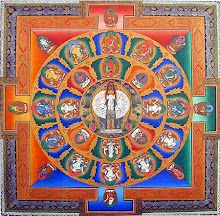




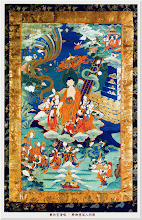

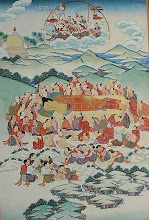


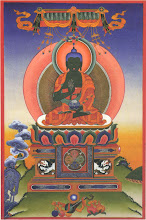




.jpg)

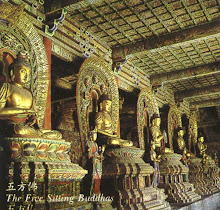













No comments:
Post a Comment